LIVE at the Hand House in Elizabethtown, NY
Reservations only.
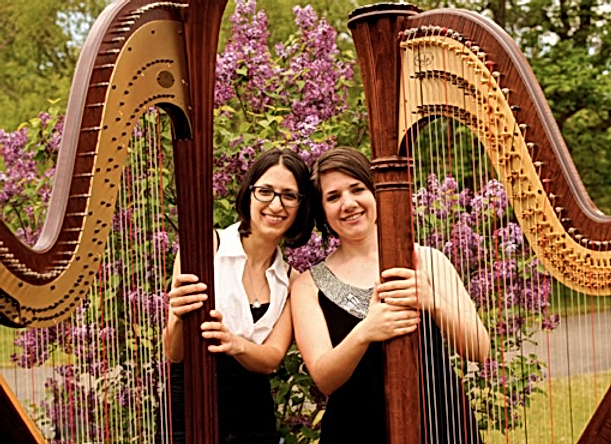
Lilac 94: Kathryn Sloat and Christina Brier | Photo by Gerry Szymanski
Piano by Nature will provide the most up-to-date guidelines here on the PBN website to ensure our concertgoers will be as safe as possible, and we ask that you please stay in contact regarding any new developments along the way.
We will follow our traditional format of a Saturday night concert at 7PM, and a Sunday afternoon concert at 3PM. The doors will be open at 6:15 on Saturday and 2:15 on Sunday, and we encourage attendees to arrive early to avoid lines at check-in. We will require that our attendees show proof of vaccination and wear masks at this time.
Tickets $20/person. Reservations are required and may be made by email (pianobynature@gmail.com) or by phone (518-962-8899) and seats will be obtained on a first-come-first-served basis. There will be no walk-up seating available.
PBN is committed to serving our dedicated community, so, when possible, we will provide video recordings of the live concerts on our website throughout the season for those of you who choose to enjoy them at home. Thank you again for your generosity and continued support. We’ll see you soon at the Hand House!
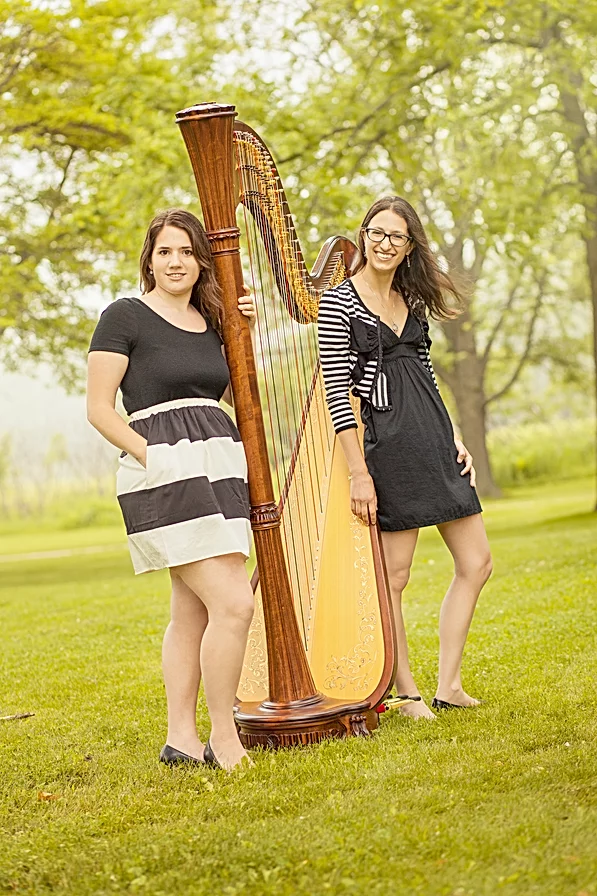 After an incredibly meaningful return to live concerts presented at the Hand House this April, we next want to welcome Lilac 94 to our concert stage for two concerts on June 11 & 12. Harpists Kathryn Sloat and Christina Brier were originally scheduled to appear last year, so we are eager to finally get to hear them live, particularly now with our ‘new’ Russell Ames Steinway grand (we are still in the throes of fundraising for this incredibly fine instrument–please take a look here to donate). We look forward to seeing you all at the concerts and thank you so much for the continued support you have so generously given these past two years.
After an incredibly meaningful return to live concerts presented at the Hand House this April, we next want to welcome Lilac 94 to our concert stage for two concerts on June 11 & 12. Harpists Kathryn Sloat and Christina Brier were originally scheduled to appear last year, so we are eager to finally get to hear them live, particularly now with our ‘new’ Russell Ames Steinway grand (we are still in the throes of fundraising for this incredibly fine instrument–please take a look here to donate). We look forward to seeing you all at the concerts and thank you so much for the continued support you have so generously given these past two years.
The title of our program, Laughter, Tears, and Sleep was inspired by an ancient Irish folk myth relating to the emotional power of the harp and its ability to invoke gaiety, allow tears for sadness, and soothe a person’s anxieties into sleep, which seems like a particularly good way to encompass our shared experiences of late. This past year has been fraught with many emotional swings, and the music in this concert will most certainly cover them, soothing the spirit with both hope and harps. And as the world continues to emerge from the Covid pandemic, we look forward to re-entering the familiar milieu of live performance, sharing our aspirations and dreams for a better world with you through this music. The cornerstone of the concert is a gorgeous, world premiere by Puerto Rican composer, Iván Enrique Rodriguez entitled, Somnium, which portrays the uncertainty of longing while reminding us that “the future can be better than the now and the yesterday.” From the balance and clarity of César Franck’s Prelude, Fugue, and Variations to the dazzling chaos of Rebecca Larkin’s The Juniper Tree, and the contrasting tone colors presented by piano and harp in Kincaid Rabb’s Switchback Daredevils, we will explore the very broad range of emotions from our shared human experiences of the past, present, and ultimately, toward the future.
OUR PROGRAM
The Juniper Tree by Rebecca Larkin for 2 harps
Prelude, Fugue, Variation by César Franck for 2 harps
Switchback Daredevils by Kincaid Rabb for harp & piano
Snowdrift by Sean William Calhoun for harp & piano
Somnium by Iván Enrique Rodríguez World Premiere for 2 harps
Over the Stone by Karl Jenkins for two harps and piano
World Premiere by Jinhee Han, American Harp Society commission for 2 harps
In Celtic Mythology, the Dagda was the king of an ancient race of fairy people called Tuatha De Dannan, and he owned several magical and valuable possessions: a cauldron of plenty which never ran empty and fed every man that sat down to it; a mighty club which one end could kill a man and the other restore him to life; and his greatest possession which only he could play–a harp. When played, it made the seasons appear in order and could make anyone who heard it laugh with joy or weep with sorrow.
These properties became known as the Three Noble Strains of harp music:
1) The Goiltai, or “sorrow strain” which caused people to weep.
2) The Geantrai, or “joy strain” which encouraged people to laugh.
3) The Suantrai, or “sleep strain” which lulled people to sleep.
The story continues. The Fomorians were great enemies of the Tuatha De Dannan. They believed that taking possession of this harp was the best way to defeat the Tuatha dé Danaan. They stole the harp, hung it on their banquet hall wall, and then feasted in celebration of their victory.
The Dagda was of course furious and ventured out in search of his treasured harp. They eventually found the hall, and the Dagda burst through the doors. He summoned his harp which flew across the hall and into his hands. The Dagda then played The Three Noble Strains of music (The Irish Place).
First, he played the Goltrai, the strain of sorrow, which made the Formorians cry uncontrollably. The tears filled their eyes until they could no longer see. In their despair, they reached for their weapons to try and attack.
Then, The Dagda played the second Noble Strain, the Geantrai, or the strain of merriment. This made the Formorians laugh! They laughed so hard that they dropped their weapons.
Finally, The Dagda played the third Noble le Strain, Suantrai, or the strain of sleep. This gentle music lulled the enemy into a deep sleep, leaving the Dagda and his warriors free to leave, taking the magical harp with them.
Interested in learning more?
- Robertson, A. (2021). The harp in Irish mythology. https://www.ailierobertson.com/harp-tips-blog/2021/6/1/the-harp-in-irish-mythology
- Connor. (2021). Dagda’s harp and the Tuatha dé Danaan. https://www.theirishplace.com/heritage/irish-myths-and-legends/dagdas-harp-and-the-tuatha-de-danaan/
This article is a beautiful summation from a musician’s perspective on some of the very best things about playing music by living composers: 4 Reasons to Play Music by Living Composers.
The artists in this June concert attended Rochester’s famed Eastman School of Music, which is celebrating the creation of 100 years of incredible musicians, teachers, and performances. Here is just a small look into the history of this wonderful school: Eastman School of Music Celebrates 100 Years.
Program Notes
- The Juniper Tree by Rebecca Larkin (6 min) – 2 harps
Rebecca Larkin is a musical storyteller. As a composer and flutist, her music conveys an unraveling narrative that she and her audience can interpret in any way they wish.
Inspired by soundtracks and concert music alike, Rebecca writes visual music for the stage and screen. She has been named a finalist for the ASCAP Morton Gould Young Composer awards and a scholar for the Game Audio Network Guild (GANG). She is an enthusiastic collaborator and constantly seeks opportunities to create new cross-disciplinary work.
- Prelude, Fugue, Variation by César Franck (9 min) – 2 harps [a nod to the “familiar”)
César Franck (1822— 1890) was a Belgian-French Romantic composer and organist who was the chief figure in a movement to give French music an emotional engagement, technical solidity, and seriousness comparable to that of German composers.
- Switchback Daredevils by Kincaid Rabb (8 min) – harp & piano [Kate would be premiering as a commission consortium member)
Kincaid Rabb (b. 1993, they/them pronouns) is an award-winning composer, working at the intersection of storytelling and new music. Kincaid is an artist-scholar whose research includes musical narratology, emotional catharsis, and the phenomenon of the theme park as inspiration. Using narration, worldbuilding, and a strong sense of fun and play, Kincaid creates musical experiences that immerse audiences into intimate spaces and that reward waders, swimmers, and divers alike. Kincaid produces works that trapeze artistic disciplines, curating performances that seamlessly integrate different sensory experiences and create lasting memories through music.
- Snowdrift by Sean William Calhoun (6 minutes) – harp & piano [Calhoun is Eastman alum]
Sean William Calhoun composes music of vibrant harmonies, written with performers in mind. His collaborations have included Maelstrom (for thirteen saxophones), composed for the Eastman Saxophone Project, Fluctuations (for violin, bass clarinet, and marimba), composed for the trio F-PLUS; Abyss Lustre (for flute and harp), Sonata for Flute and Piano, and Windrunner, composed for flutist Emma Resmini; and Rushing Asunder, for solo harp, for harpist Rosanna Moore. His orchestral work Constellated Traces was selected to be premiered by the Eastman School Symphony Orchestra in fall 2018. The Peabody Wind Ensemble, conducted by Harlan Parker, premiered his piece Edgedancer.
- Somnium by Iván Enrique Rodríguez (~7 min) – 2 harps.
Puerto Rican composer Iván Enrique Rodríguez’ (b.1990) music has been performed in P.R., the U.S., throughout North/South America and, Europe where in Italy, his piece Madre Luna, received 2014’s Rimini International Choral Competition prize; and where his Crípticos Nos. 1, 2 & 3 acquire him one of 2015’s International Composition Competition Maurice Ravel awards. He also won 2015’s American Composers Orchestra EarShot Program, with maestro Rossen Milanov and Columbus Symphony giving the U.S. premiere of his piece Luminis, also receiving the Audience Choice award. Rodríguez received the 2019’s prestigious ASCAP Leonard Bernstein Award and ASCAP Morton Gould Young Composer Awards’ honorable mention, and was invited to participate as composer-in-residence in the historic Cabrillo Festival of Contemporary Music 2020 season. His musical-social involvement was recognized Musical America Worldwide naming him one of the 2021 Top Professionals of the Year, and by Junior Chamber International with 2014’s Ten Outstanding Young Persons of the World award in P.R.
- Jinhee Han (newly commissioned piece for Lilac 94)
Award-winning Korean-American musician, Jinhee Han is a NYC/BOSTON based composer from Seoul, South Korea. She holds a Bachelors degree and a Masters degree in composition from HanYang University and a Professional Studies Diploma from The New School, Mannes School of Music under the direction of Robert Cuckson. As Han creates deep, emotive musical languages that build cultural and artistic bridges, She serves as Founder/Director for Asian Women Composers Association in New York City, where she collaborates with a variety of talented musical projects such as Lilac94, The Half Moon Project, Concrete Timbre, Cobalt, and more from various countries. Her recent publications include ‘We cry’ for solo clarinet by Diaphonia Edition in Italy, 2020, and ‘To my daughter’ for Bb trumpet and Bass trombone on Women and Music, Volume 24, 2020 by University of Nebraska Press Journals. Selected collaborations include Habitat Home NYC 2019, Tokyo to New York ‘The moments in this time’ 2020, and Han has been awarded for ‘commission work’, Bostonian Lab1 for Geo Mun Go ensemble, and has been premiere by LAMI ensemble, July. 1st. 2021 in Korea. Currently, she is studying music composition under direction of Joshua Fineberg in the Doctor of Musical Arts degree program at Boston University College of Fine Arts School of Music.
- Over the Stone by Karl Jenkins, 3 movements
Sir Karl William Pamp Jenkins (born 17 February 1944) is a Welsh multi-instrumentalist and composer. His best known works include the song “Adiemus” and the Adiemus album series; Palladio; The Armed Man; and his Requiem.
Jenkins was educated in music at Cardiff University and the Royal Academy of Music: of the latter, he is a fellow and an Associate. He joined the jazz-rock band Soft Machine in 1972 and became the group’s lead songwriter in 1974. Jenkins continued to work with Soft Machine up to 1984, but has not been involved with any incarnation of the group since. Jenkins has composed music for advertisement campaigns and has won the industry prize twice.
About Lilac 94
 As the Wilmington Star News writes, “Christina Brier and Kathryn Sloat of Lilac 94 aren’t your grandmother’s harpists. Brier and Sloat hit their soundboards, pound their harps with mallets, slap their strings, and generally make a ruckus.” The contemporary harp duo is dedicated to performing new and previously undiscovered music and exploring creative ways of using the harp. Since 2013, Lilac 94 has been performing new and underrepresented music as well as standard repertoire with the aim of exposing audiences of all ages to the versatility of the modern pedal harp.
As the Wilmington Star News writes, “Christina Brier and Kathryn Sloat of Lilac 94 aren’t your grandmother’s harpists. Brier and Sloat hit their soundboards, pound their harps with mallets, slap their strings, and generally make a ruckus.” The contemporary harp duo is dedicated to performing new and previously undiscovered music and exploring creative ways of using the harp. Since 2013, Lilac 94 has been performing new and underrepresented music as well as standard repertoire with the aim of exposing audiences of all ages to the versatility of the modern pedal harp.
The award-winning contemporary harp duo performs classic harp repertoire to Bollywood as well as twenty-first century works that have been written for them in a wide variety of venues that has ranged from the Rohs Street Cafe (OH) and Champlain Centre Mall (NY) to the Milwaukee Art Museum (WI), and Fishtank Theater (MO) to MISE-EN-Place in Brooklyn, Fringe Arts in Philadelphia, and The Troy Savings Bank Music Hall (NY) to Satosphère at Société des arts technologiques in Montréal. Highlights of 2018 included performances in Philadelphia in a full production of Karlheinz Stockhausen’s KLANG: The 24 Hours of the Day presented by Analog Arts and producer Elizabeth Huston and capturing Third Prize at the International Harp Competition in Saluzzo, Italy.
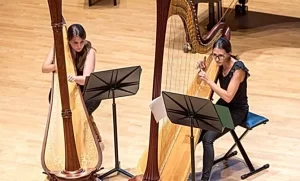 Lilac 94 has continued its work with Analog Arts by performing the Canadian premiere of Stockhausen’s “Freude” (Joy), the second hour of KLANG, at the Montréal Nouvelle Musiques Festival presented by La Société de Musique Contemporaine du Québec in early 2019. In June, Lilac 94 joins Conductor Steven Errante and the Wilmington Symphony Orchestra for a performance of Sir Karl Jenkin’s double-harp concerto Over the Stone, which was postponed due to Hurricane Florence. Remaining in North Carolina, Lilac 94 will be joined by theatrical harpist Rosanna Moore to present a workshop on incorporating unconventional elements such as percussion, speak-singing, acting, and mime into the concert performance at the American Harp Society’s 2019 Summer Institute in Winston-Salem. Lilac 94 then turns its attention to preparing an east coast tour in the fall—”American Postcards”—featuring a new work for two harps by American composer Molly O’Roark with performances in Atlanta, Kenan Chapel at Landfall, Richmond, Philadelphia, and New York.
Lilac 94 has continued its work with Analog Arts by performing the Canadian premiere of Stockhausen’s “Freude” (Joy), the second hour of KLANG, at the Montréal Nouvelle Musiques Festival presented by La Société de Musique Contemporaine du Québec in early 2019. In June, Lilac 94 joins Conductor Steven Errante and the Wilmington Symphony Orchestra for a performance of Sir Karl Jenkin’s double-harp concerto Over the Stone, which was postponed due to Hurricane Florence. Remaining in North Carolina, Lilac 94 will be joined by theatrical harpist Rosanna Moore to present a workshop on incorporating unconventional elements such as percussion, speak-singing, acting, and mime into the concert performance at the American Harp Society’s 2019 Summer Institute in Winston-Salem. Lilac 94 then turns its attention to preparing an east coast tour in the fall—”American Postcards”—featuring a new work for two harps by American composer Molly O’Roark with performances in Atlanta, Kenan Chapel at Landfall, Richmond, Philadelphia, and New York.
Lilac 94 has commissioned this new piece by Molly O’Roark to round out the works in the duo’s Suites, Stories & Soundscapes recording project. It is a prime example of their mission to promote the versatility of the modern pedal harp while expanding the repertoire for two harps. Lilac 94 has also worked with composers such as Bret Bohman (“Swirl” and “Foglifter”), Rebecca Larkin (“The Juniper Tree”), and Daniel Morel (“KC Blue”). With its program of 21st century works, Lilac 94 featured these works at the 2015 American Harp Society’s Summer Institute with a subsequent Midwest tour including Kansas City, which was the inspiration for Morel’s award-winning composition.
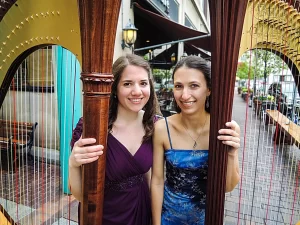 With roots in North Carolina and New York, Lilac 94 is pleased to continually share their musical collaboration with the communities of Wilmington (NC) and New York’s Greater Capital Region. As new programs begin to bud, these communities have nurtured the duo’s growth and often give Lilac 94’s programming a first listen. While performing newly discovered or forgotten repertoire and collaborating with composers to bring their work to life is central to Lilac 94, coaching young harpists is also important to the duo. Over the years, Lilac 94 has enjoyed developing inventive outreach programs, workshops, and masterclasses for various harp camps, ensembles, and college programs such as the Connecticut Valley Harp Intensive, Christopher Newport University, Virginia Commonwealth University, and the HARPS Foundation (home of the American Harp Youth Ensemble) in Richmond, VA.
With roots in North Carolina and New York, Lilac 94 is pleased to continually share their musical collaboration with the communities of Wilmington (NC) and New York’s Greater Capital Region. As new programs begin to bud, these communities have nurtured the duo’s growth and often give Lilac 94’s programming a first listen. While performing newly discovered or forgotten repertoire and collaborating with composers to bring their work to life is central to Lilac 94, coaching young harpists is also important to the duo. Over the years, Lilac 94 has enjoyed developing inventive outreach programs, workshops, and masterclasses for various harp camps, ensembles, and college programs such as the Connecticut Valley Harp Intensive, Christopher Newport University, Virginia Commonwealth University, and the HARPS Foundation (home of the American Harp Youth Ensemble) in Richmond, VA.
Kathryn Sloat, “whose harp playing evoked the angels” (Brooklyn Discovery), is known for her work in opera and contemporary chamber music. Kathryn, a NY Capital Region native and alum of the Empire State Youth Orchestra, is based in New York City where she keeps busy freelancing and teaching at the Diller-Quaile School of Music. Kathryn also teaches at the acclaimed Luzerne Music Center in New York’s Adirondack Park. When not performing and touring with Lilac 94, Christina Brier serves as Principal Harpist of the Carolina Philharmonic and Wilmington Symphony Orchestra, actively freelances, is a member of the University of North Carolina Wilmington music faculty, and manages her own studio in addition to fulfilling her duties as President of the Coastal Carolina Chapter of the American Harp Society and Executive Director at the Brooklyn Arts Music Academy in Wilmington.
Christina Brier and Kathryn Sloat formed Lilac 94 in 2013 as the two completed their graduate studies at the Eastman School of Music. The duo’s name reflects their origins in Rochester, where the lilac is the city flower, and the 94 strings between their two harps. Lilac 94 can be found online via various social media as @Lilac94duo and at www.Lilac94.com. Lilac 94 maintains memberships in the American Harp Society and Chamber Music America.
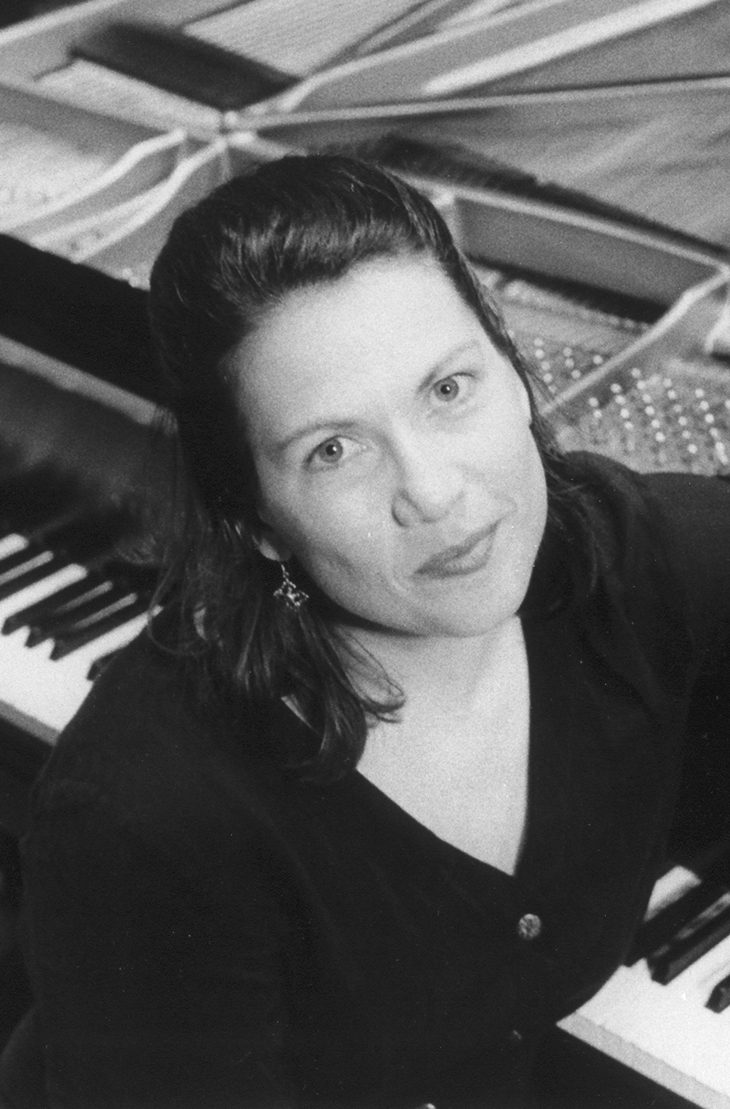
About Rose Chancler
Rose is an active and wide-ranging pianist who, in addition to performing internationally, has given hundreds of concerts in over twenty-five American states. Rose frequently performs and records as a soloist and collaborative artist, while maintaining a lively teaching practice. Ricochet Duo – Rose’s collaborative ensemble with marimbist Jane Boxall – performs regularly throughout the U.S., with concert highlights including Indiana University Pennsylvania, Vermont’s Flynn Center, the Chautauqua Institution, Eastman School of Music, and a Manhattan showcase for the New York State Presenters Network. Rose has also enjoyed a long collaborative association with virtuoso double bassist Volkan Orhon, resulting in two highly-acclaimed CD releases of violin and cello masterworks on the Centaur label. Rose has performed with Volkan on BassEurope recitals in Prague, the Friends of Chamber Music series in Tucson, Concert Artists Guild in Pittsburgh, a spotlight concert at the American String Teachers Association Louisville, KY convention, and numerous International String Bass conventions in Fort Collins, CO, San Francisco, CA, Oklahoma City, OK, and Penn State University in State College, PA.
Closer to home, Rose enjoys concertizing as a member of MetaMusic which presents well-written, unusual compositions for violin/saxophone/piano trio and other combinations. Rose’s additional chamber-music performance experience includes recitals with internationally-known artists Linda Rosenthal, Jeffrey Solow, Harvey Pittel, Carol Wincenc, and Broadway’s George Hearn. Currently, Rose is focused on performing chamber music and presenting concerts in New York’s Adirondack Park as a founding member and Artistic Director of the dynamic series Piano by Nature in Elizabethtown, NY.
Rose has held teaching positions at the University of Alaska, Fairbanks, the Baylor University School of Music, and the University of Iowa School of Music. She has been a faculty accompanist and coach at the Chautauqua Institution for many years, and also worked at the acclaimed Meadowmount School of Music. She has served on the faculty of SUNY Plattsburgh, and now maintains a private studio in Westport, NY. Rose holds a bachelor’s degree in Piano Performance from the University of Texas at Austin, and master’s and doctoral degrees in Piano Performance and Literature from the Eastman School of Music.
The Rare Music For Harp and Piano
Within the broad spectrum of chamber music repertoire, pairings of harp and piano are rare. Perhaps that’s because the sometimes subtle differences between the sounds of a piano and a harp in tandem made many composers question the practicality of partnering the two.
Yet upon hearing both instruments together, many listeners have been captivated by the blending of the piano’s more solid and incisive sonorities with the harp’s diaphanous and celestial sounds. Their musical partnership is especially magical in quieter passages where even the sharpest ears can’t always discern just where one instrument leaves off and the other begins.
Since relatively few composers have written music for harp and piano, harpists themselves (or selected arrangers) have blessed us with often striking musical syntheses of well-known classics, adding fresh sonic and interpretive dimensions to these familiar pieces. And certain intrepid composers, as well as compositionally gifted harpists, have created impressive music for these instruments that both delights the ear and satisfies the soul. (delosmusic.com)
For our concerts we are presenting the latter: a fresh and exciting new set of works hot off the press. And works specifically crafted for our artists–it just doesn’t get much better than that!
Also, we recommend you check out this recent New York Times article that talks about How The Harp Got Hip.
Please consider sending a donation to Piano by Nature to help us continue to support our artists and deliver exceptional live music to the North Country and beyond. You can mail a check to Piano by Nature, 32 Champlain Ave., Westport, NY 12993. Or donate online through the Donate button below (using your Paypal account or credit card). If you have questions or ideas, feel free to call Rose at 518.962.8899. I’d love to hear from you.
This project is made possible with funds from the Restart New York Regrants 2021–22 Mini-Grant program, a regrant program of the New York State Council on the Arts with the support of the Office of the Governor and the New York State Legislature and administered by the Adirondack Lakes Center for the Arts. Made possible, in part, by the Essex County Arts Council Cultural Assistance Program Grant supported by the Essex County Board of Supervisors.


